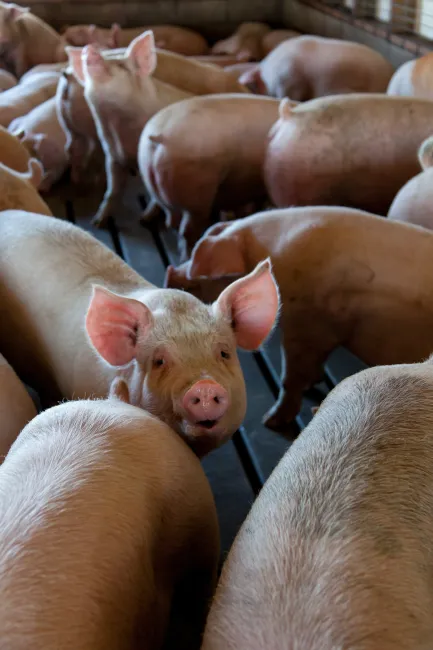Recent investigation by Greenpeace and journalism by the guardian reveals how a declaration published in a scientific journal and signed by over 1,000 scientists in support of meat production has numerous links to the livestock industry. The document, which has been criticised by numerous scientists, has been used to target EU officials and may have contributed to delays and backtracking in meat reduction legislation.

Summary
The Dublin Declaration, published last year, argues that contemporary debates on the role of meat and livestock are reductionist and that there is a need to rebalance the conversation. The declaration highlights the positive roles that livestock can have on human health, the environment and socio-economic outcomes. The declaration highlights the need for scientific integrity, reliable evidence and the need to give voice to “diligent and honest research”. The statement has since been used to lobby top EU officials and has been endorsed by the EU agricultural commissioner.
The declaration has recently resurfaced in the news, having previously been published by The Telegraph and the New York Post, after freedom of information acts filed by Greenpeace revealed that it was written, released and promoted by agribusiness consultants, and has been used by trade groups and lobbyists to oppose green policies in Europe. The declaration was published without any declaration of funding or competing interests and when questioned about industry links the organising committee maintained this does not affect the objectivity of the scientific research.
The Dublin Declaration was launched following a conference held by Irish agricultural agency Teagasc, which featured presentations by the lead authors, including Peer Ederer, an economist who runs an agribusiness consultancy. Ederer was also the guest editor of the issue of Animal Frontiers journal that published the declaration and was described in released emails as the “primary author” of the declaration, which he denies. Ederer has previously worked as a consultant for McDonalds, US meat producer Smithfield, and soya giant Bunge. Ederer previously gave a talk to the Global Warming Policy Foundation, the UK’s principal climate science denial group, titled ‘Why cows are not responsible for man-made climate change’. He told the group that while he is not a scientist, he is “trained to read scientific papers”. Ederer wrote in email that the declaration is revised from a position paper prepared by groups including nine private industry associations such as the International Meat Secretariat, International Poultry Council and the International Dairy Federation for the UN food systems summit in 2021.
In response to criticism from the Irish politician Neasa Hourigan, Declan Troy, assistant director of research at Teagasc, noted the ‘close ties’ members had to the meat sector and compiled a list of possible links the organising committee had. Industry links with four more of the six authors are detailed in Greenpeace’s coverage.
The declaration has provoked multiple responses from the wider scientific community. Prof Peter Smith of the University of Aberdeen, UK, a lead author on eight reports by the authoritative Intergovernmental Panel on Climate Change, viewed the declaration as extremely poor, selective science and is working with other experts on a comprehensive rebuttal. Specifically he assured that evidence that applied to a small fraction of global livestock was generalised as if it applied to the entire system and that the paper fails to give a balanced view of the serious public health and environmental harms of the livestock sector.
TABLE Director Tara Garnett was one of 16 co-authors of a letter published in nature food that reiterates that the declaration contains unsubstantiated generalisations and deliberate downplays ‘research demonstrating the incompatibility of current and projected levels of consumption of animal products with the imperatives of bringing humanity’s economy within the planetary biophysical limits’. The letter emphasises that scientific consensus has been reached on the incompatibility, perils and needlessness of the global adoption of Western diets (industrialised, highly processed, animal and grain product heavy). Instead, the co-authors write, the focus of research is on a just transition to a sustainable food system that couples the reduction of unnecessary animal products in high-income countries with socio-demographic targeting of interventions to increase animal product consumption when this aligns with positive health and environmental outcomes. Whilst the co-authors of the letter do not refute aspects of the declarations that highlight health and environmental benefits of the meat industry, they highlight that these are specifically attributable to agroecological livestock production, which will require a decrease in the intensity and therefore total global production of livestock.
- The Original Dublin Declaration
https://academic.oup.com/af/article/13/2/10/7123469
- The special issues of Animal Frontiers guest editor by authors of the Dublin Declaration
https://academic.oup.com/af/issue/13/2
- Letter written in Nature Food by authors of the Dublin Declaration in response to media criticism
https://www.nature.com/articles/s43016-023-00784-z
- A response to the letter also published in Nature Food by Tara Garnett, amongst others
https://www.nature.com/articles/s43016-023-00866-y
- The Greenpeace Unearthed report
https://unearthed.greenpeace.org/2023/10/27/dublin-declaration-meat-livestock-industry/
- The Guardian’s Coverage




Comments (0)